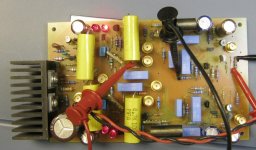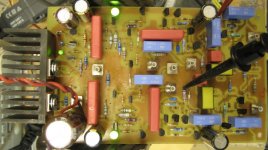Hello,
Why we can't use 50 ohm SMA connector on audio board signal line ?
I want to carry audio signal with coax cable from this connector which on my amplifier board to RCA connector on chassis.
[image]Image:sma connector|none[/image]
Will it be negative effect to sound ? Why i can't use 50 ohm connector instead of any other connectors which compatible with audio amp board ?
Why we can't use 50 ohm SMA connector on audio board signal line ?
I want to carry audio signal with coax cable from this connector which on my amplifier board to RCA connector on chassis.
[image]Image:sma connector|none[/image]
Will it be negative effect to sound ? Why i can't use 50 ohm connector instead of any other connectors which compatible with audio amp board ?
Hello,
Why we can't use 50 ohm SMA connector on audio board signal line ?
I want to carry audio signal with coax cable from this connector which on my amplifier board to RCA connector on chassis.
[image]Image:sma connector|none[/image]
Will it be negative effect to sound ? Why i can't use 50 ohm connector instead of any other connectors which compatible with audio amp board ?
It might negatively impact the sound because of the resistance and lack of proper shielding.
Hello,
"Why i can't use 50 ohm connector "
50 Ω is not the serie resistor of the connector, but the characteristic impedance when it is used in hyper frequencies items.
For practical purposes you can even use a banana to transfer electricity. But that doesn't mean you should.
When I get home I'll show you a picture and some readings of why you shouldn't, in Cass others haven't done by then.
Fiddly, annoying and unnecessarily expensive.
I used to work a lot with microwave systems up to 18GHz. I thought about using SMA for audio for about 5 minutes, about 25 years ago.
At microwave frequencies SMA, APC7 etc connectors are essential to achieve low loss connections, and to be compatible with the associated coax.
You sure can use them at audio, but you need to remember (or accept) that at audio frequencies, most of what makes them good for RF / microwave just does not apply:
- Impedance control
- Low loss dielectric
I guess that you would have:
- good overall screening if you stuck to microwave cables
- Low resistance (which at audio is what it will be - there is no sense in saying impedance with regards to these connectors at 20kHz
Anyway, if it makes you smile, do it.
I used to work a lot with microwave systems up to 18GHz. I thought about using SMA for audio for about 5 minutes, about 25 years ago.
At microwave frequencies SMA, APC7 etc connectors are essential to achieve low loss connections, and to be compatible with the associated coax.
You sure can use them at audio, but you need to remember (or accept) that at audio frequencies, most of what makes them good for RF / microwave just does not apply:
- Impedance control
- Low loss dielectric
I guess that you would have:
- good overall screening if you stuck to microwave cables
- Low resistance (which at audio is what it will be - there is no sense in saying impedance with regards to these connectors at 20kHz
Anyway, if it makes you smile, do it.
I used them for a test box where I'd be changing concepts under test fairly often. I really didn't want to be prying off RCA connectors, and BNCs take up too much room. I cut up pre-made cables to get the interconnects - if you look in the right places, they're not that expensive. The same goes for the mating PCB connectors.
Here's a couple of examples, one using SMA, one miniature SMB.
Here's a couple of examples, one using SMA, one miniature SMB.
Attachments
Now we wait for articles to appear in the audio magazines touting the benefits of N connectors and 1-1/4" Heliax for audio interconnects.Why don't we use N connectors for audio?
As for the OPs original question, I don't know of any reason that SMA connectors / coax couldn't be used for audio. But as others have mentioned, it's expensive and unnecessary.
Last edited:
DF96 -
Hardee har, Har...
I only use the mini RF connectors for internal interconnects that are used to switch between experimental boards. I standardize the board size and mounting holes to expedite things. External unbalanced stuff still comes in using RCA connectors.
I may look at 90 ohm coax (old ethernet cables) for TT interconnects, as the capacitance is only 13 pF/ft, if I remember correctly. I have a box of cables lurking in the basement, and when I remember, I'll drag one out and look at it with my LCR meter. The cables +arm wiring on my current TT setup measure at ~95 pF/side, a little high for my taste.
Hardee har, Har...
I only use the mini RF connectors for internal interconnects that are used to switch between experimental boards. I standardize the board size and mounting holes to expedite things. External unbalanced stuff still comes in using RCA connectors.
I may look at 90 ohm coax (old ethernet cables) for TT interconnects, as the capacitance is only 13 pF/ft, if I remember correctly. I have a box of cables lurking in the basement, and when I remember, I'll drag one out and look at it with my LCR meter. The cables +arm wiring on my current TT setup measure at ~95 pF/side, a little high for my taste.
SMAs work just fine for audio connectors, I used to do it all the time (for non-consumer type audio frequency filter work). Much more reliable than most RCA connectors (intermittent SMAs are almost unheard of), but cost can be an issue, and harder to stick on/remove, though not really too much.
At audio you could use an AC plug, for that matter (but.... don't!)
At audio you could use an AC plug, for that matter (but.... don't!)
Actually, that reminds me of a story I heard back when I was a stereo repair tech (I didn't see the aftermath, was just told by a shamefaced customer). He wanted quick disconnects for his stereo speakers so he didn't have to dig behind his receiver that was in a cabinet. So..... he used inline AC sockets from the receiver and AC plugs to the speakers. While his receiver was in for service, his wife while cleaning found one of the unattached plugs, and (you know the rest). He said it really woke her up and caused a brief ball of flame!
i have been using it for some audio devices
i used it for my devices which them need long cable, interconnections, many inputs, many control cables and signal cables
BUT LOW PRICE CABLE WITH GOOD POWER...
so many of audio devices, video devices and some signal devices using and still fine yet...
long cable but expensive cost is not my option so i make some little experiment...
then, i got them...
i used it for my devices which them need long cable, interconnections, many inputs, many control cables and signal cables
BUT LOW PRICE CABLE WITH GOOD POWER...
so many of audio devices, video devices and some signal devices using and still fine yet...
long cable but expensive cost is not my option so i make some little experiment...
then, i got them...
- Home
- Amplifiers
- Chip Amps
- Why we can't use SMA connector for audio

